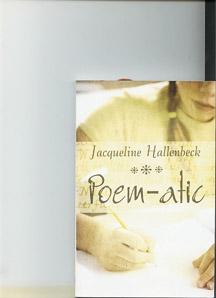Jersey City writer Jacqueline Hallenbeck’s first book of poems is a triumph of words.
Often sparse, to the point, and filled with an odd look at life, her collection of poems simply titled “Poem-atic” cuts through ordinary moments, down to their meaty emotional core.
But perhaps Hallenbeck is at her best with the weirdly wonderful and strange thoughts that so often occur, but are rarely uttered, as in “Face it”:
“A face in the crowd, a grotesque one no doubt, is scaring me dead. What nightmare is this? The poor wretched is in front of my head.”
The poet draws much of her subject matter from life, yet turns many ordinary moments on their head. Hallenbeck says that she creates the poems during the course of her day – while in the shower, driving, or before going to sleep – which gives an immediacy and stream of conscience to writing like “Determination”, which muses on motherhood: “I will have a baby before I turn 49. I’ll be changing his diaper and mine.”
Love of a different kind
Many of her poems focus on love – falling out of it, heartbreak, true love, and family ties.
Perhaps Hallenbeck is at her best with the weirdly wonderful and strange thoughts that so often occur but are rarely uttered.
________
Or the quirky “Till Death Do Us Part”: “Death, the thinnest maid, wore no ring at her wedding; and on her honeymoon, to an unsuspecting groom, a trap she’s setting.”
Hallenbeck also turns her eye to sisters in several of her poems, aptly describing the sometimes foolish quarrels of siblings, as in “Raised Well”:
“My sister claims I pick on her, she sounds a little bitter; she cries a lot, begs me to stop, but mother raised no quitter.”
Storyteller in verse
While many of the poems are short, some of Hallenbeck’s longer missives are engaging little snippets of stories, particularly in the section of the book titled “School.”
In the poem titled “Teacher,” the enamored student reflects on “the loveliest creature I have ever met… and I cannot help but dream about turning 18 and for her aging process to stop; but the older I get, she is always ahead.”
Hallenbeck also plays with words, drawing new meaning with her quirky observations of a “Hot dog.”
“Why would you eat a hot dog? The thought just makes me frown. You wouldn’t eat your daughter! Just give the dog some water! And make sure you cool him down!”
We rely on writers to be truthful, and perhaps the burden is even higher on a poet to wring out the gem of an idea in an instant with a few well-chosen words. Hallenbeck’s darker poems capture a mordantly funny humor, as in “Misery Loves Company”:
“Bring all your troubles, your ill thoughts and squabbles, your pain and heartache. Meet me tomorrow for I’m drowning my sorrow down by the lake.”
Although not every poem is as tightly rendered as when she is at her caustic best, she still manages to find a depth of feeling that is so often hidden from our everyday connections.
